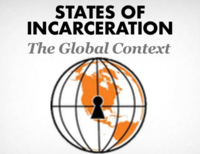Report warns U.S. prisons overcrowded
By Shaphan Marwah, U-WIRE
University Wire April 15, 2002, Monday
Prisons nationwide are overcrowded, and it is getting worse, according to a prison report released last week that shows a record increase of federal inmates last year.
The Bureau of Justice Statistics, which releases findings about prison populations twice a year, reports a 7.2 percent growth in federal prisons in the first half of 2001, compared to a 1.6 percent population growth in state prisons.
"The increase in the federal system is not surprising," explained prison reform expert Jonathan Turley, a professor at George Washington University Law School. "The elimination of federal parole and (harsher sentencing) has produced a large stagnant body of federal prisoners."
Overcrowding continues to be a problem in both state and federal prisons, according to the BJS report, with most facilities operating at more than 100 percent capacity.
Daniel Dunne, a spokesman for the federal Bureau of Prisons, said cell shortage is a problem but explained the BOP is "making several new institutions to accommodate for the projected growth in the prison population."
Turley attributed the increase of inmates to more laws. "One would expect a decrease with the aging of society overall," Turley said. "More and more politicians are yielding to criminal legislation as an irresistible political temptation."
Turley pointed to what he called common problems in the nation's prisons, including "violence" and widespread "prison rape" to overcrowding.
"Those claims are misguided," Dunne responded. "Our correctional facilities are safe, humane, efficient and secure."
Critics of U.S. prisons complained about the increase in prisoners being held in privately run prisons, which saw a 4.9 percent increase in inmates from six months earlier, according to the BJS press release.
"Private prisons tend to cut corners to increase profit," said Peter Wagner, assistant director of the Prison Policy Initiative. "The constitutional and human rights of prisoners are frequently violated." Federal officials said private facilities are supervised.
"We have direct oversight of our private prison contracts," Dunne said. "We ensure that inmates are treated appropriately."
The report's findings showed a marked discrepancy in the racial make-up of the prison, highlighting the phenomenon of disproportionate numbers of blacks and Hispanics in prison.
Wagner said there are "subtle racial biases at all levels of the criminal justice system." He emphasized cocaine laws that designate stiffer penalties for "crack" cocaine, which is more popular among blacks, than for powder cocaine, popular among whites. The decline in juvenile sentencing indicated by the report was welcomed by many critics of the prison system.
"Juveniles who need help should receive it," Wagner said. "Incarcerating juveniles with adults leaves them subject to abuse." In the wake of the latest report, some prison critics have questioned the accuracy of the statistics used by the BJS.
"There is considerable 'spin' in these reports," Turley said. "Design capacity numbers may not accurately reflect the actual conditions in a given system."
Dunne insisted the BOP was satisfied with the report's findings.



